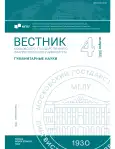Sociocultural Inclusion in Modern Russia: in Search for National Model
- Авторлар: Demina D.A.1, Fursova D.A.1
-
Мекемелер:
- Moscow State Linguistic University
- Шығарылым: № 4(885) (2024)
- Беттер: 161-167
- Бөлім: Cultural studies
- URL: https://bakhtiniada.ru/2542-2197/article/view/306535
- ID: 306535
Дәйексөз келтіру
Толық мәтін
Аннотация
The article is dedicated to inclusive education in Russia in the aspect of national identity. Basing on comparative analysis of the definition of the concept “inclusion” in Russian, English and German dictionaries, the authors reveal differences between the concepts of “inclusion” in Russian and Western cultures. The research also covers some modern inclusive education issues in Russia. The authors conclude that development of inclusive education should go in compliance with Russian cultural code and high-contextuality of Russian culture.
Авторлар туралы
Darya Demina
Moscow State Linguistic University
Хат алмасуға жауапты Автор.
Email: dasha_k@mail.ru
PhD (Pedagogy), Assistant Professor, Head of Inclusive Education Support Center
РесейDarya Fursova
Moscow State Linguistic University
Email: da_fursova@mail.ru
PhD (Culturology), Assistant Professor at the Department of Linguistics and Professional Communication in Humanities and Applied Sciences
РесейӘдебиет тізімі
- Ermalevichyus, Yu. Yu. (2020). Vsemirnaya socialisticheskaya revolyuciya. = The World Socialist Revolution. Moscow. (In Russ.)
- Rozhdestvenskaya, E. YU., Voronkova, A. I. (2022). Achievement femininity: media representation of the professional careers of women top managers and entrepreneurs. The Journal of Social Policy Studies. Vol.20, № 1, 37–52. (In Russ.)
- Sorokin, N. Yu., Lukovenko, T. G. (2018). Readiness for Training Disabled Students in Academic Staff of Universities. Psychological Science and Education. Vol. 23, № 2, 68–76. (In Russ.)
- Hitryuk, V. V. (2018). Inklyuzivnaya gotovnost’ pedagogov: genezis, fenomenologiya, koncepciya formirovaniya = Inclusive readiness of teachers: genesis, phenomenology, concept of formation. Belarus’, Baranovichi: BarGU, (In Russ.)
- Afanasiev D. V., Denisova O. A., Lekhanova O. L., Ponikarova V. N. (2019). Higher Education Teacher Readiness for Inclusive Education. Psychological-Educational Studies. Vol. 11, № 3, 128–142. (In Russ.)
- Yamburg Ye. S. (2017). Teacher Professional Development: Evaluation and Responsibility. Psychological Science and Education. Vol. 22, № 4, 5–6. (In Russ.)
- Sozdanie inklyuzivnoj obrazovatel’noj sredy v obrazovatel’nyh organizaciyah: metodicheskie rekomendacii dlya rukovodyashchih i pedagogicheskih rabotnikov obshcheobrazovatel’nyh organizacij = reating an inclusive educational environment in educational organizations: methodological recommendations for managers and teaching staff of educational organizations / Alekhina, S. V. et all. Moscow: MGPPU. (In Russ.)
- Vygotskij, L. S. (1999). Dinamika umstvennogo razvitiya shkol’nika v svyazi s obucheniem = The dynamics of a student’s mental development in connection with learning // Educational psychology. / In V. V. Davydova. Moscow: Pedagog. (In Russ.)
- Zaliznyak, A. A., Levontina, I. B., Shmelev, A. D. (2005). Klyuchevye idei russkoj yazykovoj kartiny mira = Key ideas of the Russian language picture of the world: collection of articles. Moscow: Languages of Slavic Culture. (In Russ.)
- Bochkarev, A. E. (2017). On sense of zhalost′ (‘pity’) and related concepts in the Russian linguistic consciousness. Slavica Slovaca. Vol. 52, № 2, 110–121. (In Russ.)
- Hall, E.T. (1989). Beyond Culture. Anchor Books.
Қосымша файлдар










